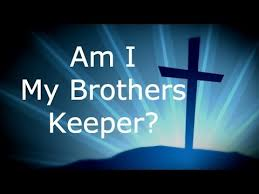Am I My Brother’s Keeper?

Recently, I sought God’s face about an issue, and He responded with Genesis 4:9. At first, I didn’t understand how my question related to the story about a man killing his brother out of envy. Until God opened this verse in a way that surprised me.
The first time I read this verse as a child; I was struck by how incredibly selfish and wicked Cain was. And rude too?
Different translations emphasize the audacity of his response:
“Afterward the Lord asked Cain, ‘Where is your brother? Where is Abel?’ ‘I don’t know,’ Cain responded. ‘Am I my brother’s guardian?’” Genesis 4:9 (NLT)
“Then the Lord said to Cain, ‘Where is Abel, your brother?’ Cain replied, ‘I do not know where he is. Must I always keep my brother safe?’” Genesis 4:9 (EASY)
“The LORD asked Cain, ‘Where is your brother Abel?’ He answered, ‘I don’t know. Am I supposed to take care of my brother?’” Genesis 4:9 (GNBUK)
My young mind was irritated by Cain. He was a wicked man, and his response felt cold and heartless. But God used this verse to teach me something deeper, something beyond Cain’s wickedness. He used it to show me the danger of ignorance. Cain’s Problem was a lack of knowledge and accountability. Cain wasn’t just wicked. He was ignorant. Infact, the foundation of his wickedness was his ignorance. He was ignorant of his role and responsibility.
As the firstborn in a Hebrew family, Cain was supposed to be the leader, the protector, the one who ensured the well-being of his siblings. When the father was absent, the firstborn naturally stepped into a position of authority. Perhaps because Adam was a newly created man, so we can assume that the culture was still forming. But from Abel’s disposition, there were already some values instilled in Adam’s family which included the fear of God and the importance of the quality of sacrifice offered to God.
Cain didn’t understand this. It seemed he did not understand a lot of things. That’s why he asked so carelessly:
“Am I supposed to take care of my brother?”

The answer is yes! Yes, Cain. You were. But because you didn’t know, instead of protecting your brother, you killed him.
The prophet Hosea captures this perfectly:
“My people are destroyed for lack of knowledge.” Hosea 4:6 (NLT)
Cain’s ignorance led to failure in his role as the first born, failure in responsibility, and ultimately, failure in accountability before God. God entrusts people to people, whether in a home, a workplace, a church, or a community. And one day, He will ask for an account. He watches how we care for the people placed in our hands. He observes how we steward the resources given to us. And ultimately, He demands accountability.
This truth is not just evident in Cain’s story but also in the life of Jesus. Unlike Cain, Jesus fully understood His role. He was not confused about His responsibility. He knew what and who had been entrusted to Him, and when the time came, He presented His report to the Father:
“I have made you known to those you gave me out of the world. They belonged to you, and you gave them to me. They have obeyed your word, and now they know that everything you gave me comes from you. I gave them the message that you gave me, and they received it; they know that it is true that I came from you, and they believe that you sent me. While I was with them, I kept them safe by the power of your name, the name you gave me. I protected them, and not one of them was lost, except the man who was bound to be lost so that the scripture might come true.“ John 17:6-8, 12 (GNBUK)

Not one was lost except the one who was destined to be lost. Jesus understood the weight of His responsibility. He ensured that every disciple entrusted to Him was cared for, taught, and protected. And when His mission was complete, He could confidently say, “Here is my report, Father. I have done what You sent me to do.”
One day, God will ask us about the people he has sent to us to care, to protect: Where Is Your Brother?
Will we answer like Cain, ignorant and indifferent?
Or will we, like Jesus, be able to say, “I have kept them safe, and none is lost”?
